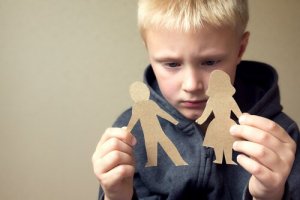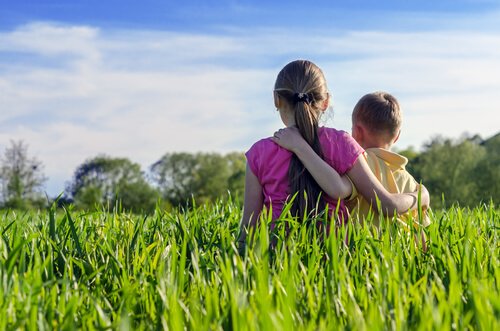How a Separation or Divorce Affects a Child

A separation or divorce can impact all family members depending on the circumstances. In many cases, it mainly affects the children.
Manipulation and lack of respect are the main temptations that no couple should ever resort to. In fact, it’s fundamental for both partners to pay attention to the language they use to communicate with each other and make the children’s well-being the main priority.
Also, feeling forced to take sides is very harmful to children’s mental health. Although you’re separating or divorcing, you don’t have to demonize one another. Instead, you should try to make the transition smooth and trauma-free.
Changes after a separation or divorce
When one parent leaves, the family falls apart in a certain way. These changes are very noticeable and inevitable for children. It’s hard to explain to them the reasons why their parents aren’t together anymore. That’s why you should focus on guaranteeing their physical, emotional, and psychological well-being instead of on explanations.
To do that, you must emphasize that both of you will always be there for them, even if you’re not together. Also, try to hint at the fact that there might be a possibility of adding new members to the family if you eventually decide to start a new romantic relationship in the future.

Uncertainty
From a child’s point of view, a separation or divorce can mean going from financial stability to a state of total uncertainty. It can also mean going from having a balanced and safe lifestyle to being surrounded by financial threats that can emotionally affect them.
Birdnesting
Joint custody is one of the solutions that guarantees the physical attention the children need from both parents. However, there’s also the risk of the children feeling that they don’t belong in either of the two houses since they constantly have to move from one place to the other.
Many children take changes in their routines, relationships, and environment really hard, which could lead them to develop emotional detachment.
Therefore, the healthiest option is for the parents to move in and out, instead of the children having to go back and forth between houses.
Fear, angst, and stress
One of the most common reactions to the changes we’ve mentioned so far is fear. Your children may be afraid of what’s going to happen in the near future. Will my parents still love me? What do I have to do now? Will I see my friends again?
These are some of the questions that might pop up in your children’s mind. As such, if you don’t help them overcome their fears, it can affect them emotionally.
That’s why it’s essential to ensure them that both parents will always be there for them. However, even if you do, it’s normal for them to feel anxious to a certain degree, especially immediately after the breakup.
On the other hand, during a separation or divorce, the oldest child may be of great support and an important role model to the youngest ones. This is because the oldest child can explain to the others what’s happening. Siblings can help ease anxiety if they feel that their parents are more focused on their own problems than on them.

Behavior changes
Children can start behaving differently during a separation or divorce to try to get their parents’ attention or to bring them closer together. They believe that if both parents agree on something, such as punishment, they’ll start working on their problems.
This is closely related to one of the most powerful negative emotions that all human beings experience: guilt. If a child feels guilty for the breakup, then they may resort to behaving in a certain way to make up for it. They may even try to engage in self-harming behavior.
All behavior changes are defense mechanisms that children use to protect themselves from the pain that they feel during a separation or divorce.
A separation or divorce can impact all family members depending on the circumstances. In many cases, it mainly affects the children.
Manipulation and lack of respect are the main temptations that no couple should ever resort to. In fact, it’s fundamental for both partners to pay attention to the language they use to communicate with each other and make the children’s well-being the main priority.
Also, feeling forced to take sides is very harmful to children’s mental health. Although you’re separating or divorcing, you don’t have to demonize one another. Instead, you should try to make the transition smooth and trauma-free.
Changes after a separation or divorce
When one parent leaves, the family falls apart in a certain way. These changes are very noticeable and inevitable for children. It’s hard to explain to them the reasons why their parents aren’t together anymore. That’s why you should focus on guaranteeing their physical, emotional, and psychological well-being instead of on explanations.
To do that, you must emphasize that both of you will always be there for them, even if you’re not together. Also, try to hint at the fact that there might be a possibility of adding new members to the family if you eventually decide to start a new romantic relationship in the future.

Uncertainty
From a child’s point of view, a separation or divorce can mean going from financial stability to a state of total uncertainty. It can also mean going from having a balanced and safe lifestyle to being surrounded by financial threats that can emotionally affect them.
Birdnesting
Joint custody is one of the solutions that guarantees the physical attention the children need from both parents. However, there’s also the risk of the children feeling that they don’t belong in either of the two houses since they constantly have to move from one place to the other.
Many children take changes in their routines, relationships, and environment really hard, which could lead them to develop emotional detachment.
Therefore, the healthiest option is for the parents to move in and out, instead of the children having to go back and forth between houses.
Fear, angst, and stress
One of the most common reactions to the changes we’ve mentioned so far is fear. Your children may be afraid of what’s going to happen in the near future. Will my parents still love me? What do I have to do now? Will I see my friends again?
These are some of the questions that might pop up in your children’s mind. As such, if you don’t help them overcome their fears, it can affect them emotionally.
That’s why it’s essential to ensure them that both parents will always be there for them. However, even if you do, it’s normal for them to feel anxious to a certain degree, especially immediately after the breakup.
On the other hand, during a separation or divorce, the oldest child may be of great support and an important role model to the youngest ones. This is because the oldest child can explain to the others what’s happening. Siblings can help ease anxiety if they feel that their parents are more focused on their own problems than on them.

Behavior changes
Children can start behaving differently during a separation or divorce to try to get their parents’ attention or to bring them closer together. They believe that if both parents agree on something, such as punishment, they’ll start working on their problems.
This is closely related to one of the most powerful negative emotions that all human beings experience: guilt. If a child feels guilty for the breakup, then they may resort to behaving in a certain way to make up for it. They may even try to engage in self-harming behavior.
All behavior changes are defense mechanisms that children use to protect themselves from the pain that they feel during a separation or divorce.
This text is provided for informational purposes only and does not replace consultation with a professional. If in doubt, consult your specialist.







